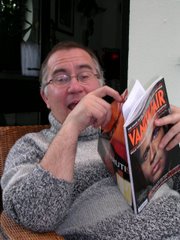It's lightweight, portable, robust, inexpensive. Novel approach: The Kindle can store 200 books and access thousands of newspapers It's so ingeniously simple that the actual book itself - the pages, the glue, the binding, the sleeves - go unnoticed to the user. They are simply the raw materials that allow us to enjoy the most important part of the book - the story it tells."
But with our very modern desire to over-engineer even the most clever designs, it's little wonder that technology companies have been talking for years about the day that "traditional" books will die, and the day that "electronic books" (known as ebooks) will become our preferred reading format.
The death of the book has been mooted for the last decade, but still people stubbornly cling to their dog-eared classics. Amazon, the online retailer, this week launched an audacious bid to change the way we read, with the release of a new ebook reader, called Kindle. Ebook readers are nothing new - Sony's Reader and the iRex iLiad have both been available for a while - but it's the first time a big book seller has thrown its considerable weight behind an ebook project in this way.
Continues ...
http://www.telegraph.co.uk/connected/main.jhtml?xml=/connected/2007/11/22/dlkind22.xml

